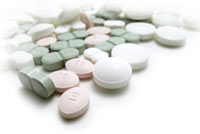 The majority of online drug retail websites operate without proper credentials and lack e-commerce security features, according to new research by brand protections specialists MarkMonitor.
The majority of online drug retail websites operate without proper credentials and lack e-commerce security features, according to new research by brand protections specialists MarkMonitor.
Researchers studied over 3,000 online pharmacies, 18% of which were UK-based, and found that over half of the websites did not secure customer data, potentially putting sensitive information at risk.
The survey looked at websites which sold the top-ranked drugs brands, and found that the majority were ‘online scammers who increasingly abused the top-ranked brands and endangered consumers by selling questionable prescription drugs through dubious online pharmacies.’
Of the 3,160 online pharmacies studied, only four were accredited as Verified Internet Pharmacy Practice Sites (VIPPS), the industry credential that assures consumers of legitimate online pharmacy operations.
Irfan Salim, president and chief executive officer of MarkMonitor said: “The data shows brandjackers are profoundly exploiting brands, using increasingly sophisticated tactics, and, in the case of the pharmaceutical industry, posing an outright danger to consumers through questionable practices that indicate counterfeiting and gray markets.
“Caveat emptor [let the buyers be aware] on the part of consumers is not a sufficient response to the depredations of online scammers and thieves; brand holders must shoulder the responsibility of protecting their brands online from the highly-developed and ever-evolving threats that brandjackers pose.”
Representative sampling of pricing for one popular drug brand showed an average of £5.48 ($10.85) for VIPPS-accredited sites in contrast to an average price of £1.37 ($2.72) for non-accredited sites. Of these, 10% of the online pharmacies studied clearly state no prescription is required to purchase the drugs.
In the UK, internet pharmacies must be registered with the Royal Pharmaceutical Society if they want to prove their authenticity.
By the end of the year, the society will have a logo in place on all authenticated sites for patients to verify the registration details of both the pharmacy and the pharmacists.
A spokesperson said: “Patients considering purchasing medicines via the internet should be encouraged to verify the website is operated from a registered retail pharmacy. This is to ensure their medicines are obtained from a reputable source and accurate and appropriate advice in relation to their medicines is received.”
The medications watchdog, the Medicines and Healthcare products Regulatory Agency (MHRA) advised patients not to buy medicines from the Internet.
“At any one time the MHRA are investigating around 100 cases where they believe there have been have been breaches of the Medicines Act relating to the illegal sale or supply of medicines via the internet.”
The report identifies the majority of the site do not use SSL encryption and more than 20% of post-purchase emails captured in the MarkMonitor analysis contained links to unencrypted customer data.
One-third of the online pharmacies in the study generate enough traffic to merit an Alexa ranking, with an average of 32,000 visitors daily. Using industry statistics for traffic conversion and average order sizes, MarkMonitor estimates that this traffic converts to $4bn (£2.2bn) in annual sales for the six drug brands studied.
The survey also found that 31% of exchange site listings originated in China followed by 26% in the United States and 19% in India.
Frederick Felma, chief marketing officer at MarkMonitor, said: “Criminals around the world continue to show a remarkable degree of adaptability and flexibility as they take advantage of the Internet to hijack well-known brands to steal funds, rob identities, launch major profit centers for counterfeit and gray-market goods and conduct other nefarious activities.
“Brand holders are left with the incredible burden of preserving the integrity of their brand on the Internet to protect their reputations, revenues and customers.”
Links
